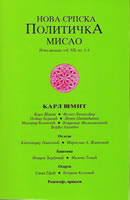| NSPM in English | |||
A New Monroe Doctrine |
 |
 |
 |
| utorak, 22. septembar 2009. | |
|
(The National Interest, 21.09.2009)
But for the reset to work, Russia must also back away from provocative actions it is taking in America’s backyard. In particular, Moscow needs to end its political and military flirtation with Venezuelan dictator Hugo Chavez. Instead, the Kremlin seems to be escalating its hostile and destabilizing moves. In the summer of 2008, a Russian general spoke of the possibility of Russia acquiring a military base in Venezuela. While civilian leaders quietly disavowed such intentions, in the following months Russian naval forces conducted joint maneuvers with Venezuelan units, and there has been a proliferation of arms sales, which topped the $4 billion mark by September 2009. The latest installment, which Chavez announced on September 13, is a $2.2 billion “loan” from Russia to purchase tanks, air-defense missiles, and other hardware. Such manifestations of close political, economic, and military cooperation between Caracas and Moscow is more than a matter of academic interest. Relations between Venezuela and neighboring Colombia have deteriorated markedly in recent years, and tensions along their border have flared on several occasions. Most, although not all, of the provocations have come from the Venezuelan side, including Chavez’s blatant support for the radical leftist insurgency in Colombia, spearheaded by the Revolutionary Armed Forces of Colombia (FARC). Russia’s willingness to boost Chavez’s military capabilities makes Moscow an enabler of such behavior. Perhaps most worrisome, Chavez has recently indicated an intention to commence a nuclear program. Given his track record of duplicity, Venezuela’s neighbors understandably view with some skepticism his assurances that such a program would be solely for peaceful purposes. It is also quite likely that Chavez hopes—and perhaps assumes—that Russia would aid the development of a Venezuelan nuclear effort in much the same way that the Kremlin has aided Iran’s program. This increasingly cozy relationship between Moscow and Caracas approaches, if it does not already cross, a red line when it comes to U.S. interests in the Western Hemisphere. It has been a long standing policy of the United States—beginning with the proclamation of the Monroe Doctrine in the 1820s—not to allow European powers to establish political or military clients in the hemisphere. Cuba, of course, has been an irritating exception to that policy for the past fifty years, but American leaders need to make it clear both to the Chavez government and the Medvedev/Putin administration that Washington will not tolerate another exception. Unfortunately, as the United States grew more powerful in the early twentieth century, the Monroe Doctrine became perverted into a policy that included U.S. attempts to meddle in the internal political affairs of its Latin American neighbors. Any effort to revive the Monroe Doctrine must take precautions not to go down that same path. Even as the Obama administration should enforce the original intent of the Monroe Doctrine with respect to Venezuela, it needs to stress that if Chavez refrains from becoming a Russian client and avoids actions that threaten Colombia or other states in the hemisphere, the United States will not seek to undermine his regime. As a tangible reassurance on that front, Washington should rescind plans to establish seven military bases in Colombia, a step that has generated fierce criticism from governments throughout South America. Ostensibly, those bases are designed to help wage the war on drugs in the Andean region (a dubious enough motive), but Chavez argues that their actual purpose is to intimidate Venezuela—or worse, to serve as staging areas for an attack. Abandoning plans for the bases would effectively discredit that argument and reassure uneasy Latin American leaders. Chavez may be an odious, authoritarian thug, but his abuses inside Venezuela are up to the Venezuelan people to deal with. They do not pose a threat to important U.S. security interests. A Russian-instigated arms buildup, to say nothing of the onset of a nuclear-arms race in the Western Hemisphere, is another matter entirely. Such actions menace the political and military stability of the region and undermine Latin America’s status as a nuclear-weapons-free zone. That prospect is very much a matter of legitimate concern to the United States. Washington should convey a message—in words of one syllable, if necessary—to both Caracas and Moscow that they are playing a very dangerous game. Chavez needs to know that his current course could lead to a regime-ending event. And Moscow needs to be told that even reasonably good relations between Russia and the United States will depend significantly on a change of its policy regarding Venezuela. President Obama has made a conciliatory gesture with the end of the missile defense plan for Central Europe. It is time for Medvedev and Putin to reciprocate. (Ted Galen Carpenter, vice president for defense and foreign policy studies at the Cato Institute, is the author of eight books on international affairs, including Smart Power: Toward a Prudent Foreign Policy for America (2008). He is also a contributing editor to The National Interest) |
Ostali članci u rubrici
- Playing With Fire in Ukraine
- Kosovo as a res extra commercium and the alchemy of colonization
- The Balkans XX years after NATO aggression: the case of the Republic of Srpska – past, present and future
- Iz arhive - Remarks Before the Foreign Affairs Committee of the European Parliament
- Dysfunction in the Balkans - Can the Post-Yugoslav Settlement Survive?
- Serbia’s latest would-be savior is a modernizer, a strongman - or both
- Why the Ukraine Crisis Is the West’s Fault
- The Ghosts of World War I Circle over Ukraine
- Nato's action plan in Ukraine is right out of Dr Strangelove
- Why Yanukovych Said No to Europe

.jpg)








 President Obama has kept his promise to hit the “reset button” regarding relations with Russia. His decision to scrap the Bush administration’s plan to deploy missile interceptors and radars in Central Europe is an important conciliatory gesture. He can and should do even more. It would be wise for his administration to abandon its ill-advised campaign to bring Ukraine and Georgia into NATO, which Moscow justifiably regards as a provocative intrusion into Russia’s security sphere.
President Obama has kept his promise to hit the “reset button” regarding relations with Russia. His decision to scrap the Bush administration’s plan to deploy missile interceptors and radars in Central Europe is an important conciliatory gesture. He can and should do even more. It would be wise for his administration to abandon its ill-advised campaign to bring Ukraine and Georgia into NATO, which Moscow justifiably regards as a provocative intrusion into Russia’s security sphere.













